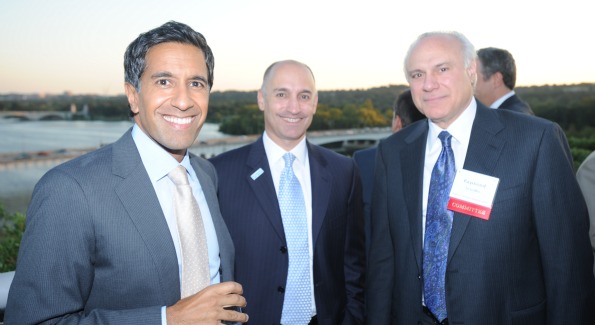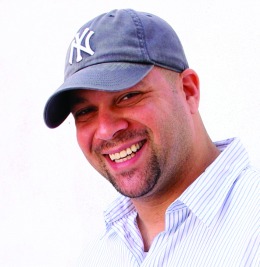Sanjay Gupta honored for child health advocacy efforts; Director Dave Rodriguez speaks out on the roots of home-grown terrorism.
By Janet Donovan
LIFE AND DEATH ISSUES
By all accounts, Dr. Sanja Gupta is a celebrity, although we’re not sure he would want to be called that. The handsome and charismatic CNN correspondent is a face seen ’round the world, best known for his dedication to bringing the tragedies of others to a worldwide landscape.
The Children’s Law Center honored the neurosurgeon on the Kennedy Center Roof Terrace recently for raising awareness about health and wellness issues having an impact on victims of natural tragedies. It was the group’s 10th annual Helping Children Soar benefit co-chaired by Diana Goldberg and May Liang and their honoree received the 2010 Distinguished Child Advocate Award.
We asked Gupta about his recent visit to Pakistan, a nation devastated by intense flooding.
“Twenty percent of the country is under water, so it’s pretty hard to access some of the places. We go to the outskirts of these areas and look at the relief camps, but it’s impossible to really get any idea of how devastated the area is right now. It’s terrible, a swath of water. A way of life is washed away,” he said, “so it’s going to be a long process of rebuilding.”
While Gupta and his colleagues are protected health-wise on these missions, it doesn’t prepare them for the emotional effect.
“Dealing with life and death is always hard for a doctor,” he said, “but as a journalist you have to believe that what you are doing has virtue; that people are going to see the stories and feel compelled to respond in some way.” Some, he noted, will react compassionately with offers of help and money. Others, however, will be more “voyeuristic” and he does worry about that. “I believe we are doing some good,” he says. “As a doctor, sometimes I have two roles out there. I think you are very proactive, but it’s emotionally tough.”
Gupta says he turned down the Obama Administration’s offer to be surgeon general because he wouldn’t have been able to practice neurosurgery as well, which he didn’t realize going into the process.
Guests at the event included Mariella and Michael Trager, Deborah Sigmund and attorney Brian Nysebaum. Covington and Burling received the Pro Bono Champion Award.
ANYTOWN
Pastor Terry Jones threatened to burn the Koran on 9/11 but was dissuaded by outrage from all sides of the issue. Director/producer Dave Rodriguez was appalled by his anticipated action and didn’t mince words on Jones. “It’s ignorant, stupid and extreme,” he said. “People like who endanger the lives of our soldiers.”
Rodriguez has a movie coming out this winter called Anytown that chronicles a middle American teenage boy who is affected by 9/11 terrorism and becomes involved in an isolated a high school altercation that escalates into a shocking hate crime. The message is that Anytown could be your town because home-grown terrorists can come from anywhere.
We asked how this can happen. “Parents seem to have lost touch with being ‘parents,’” Rodriguez asserted. “I hear them constantly saying they need to be friends with their children in order to gain their trust. No. Parents need to be firm and they absolutely need to be held accountable or, they will run the danger of their children spiraling out of control.
Ultimately, the film speaks to post-9/11 hate crimes. Rodriguez doesn’t oppose building an Islamic Center near ground zero nor does he thing it will incite violence. “I do understand both sides of the debate,” he said. “Like many New Yorkers, I lost a few friends on 9/11 and I understand how disrespected those families must feel at the mere presence of something that may connect a religion and terrorism anywhere near Ground Zero.”
To prove his point that hate is a bi-product of ignorance, he recalls that he recently overhear a family friend saying that they hated the French. “My question was, ‘How many French people do you know?’ They said ‘none.’” It all proves that such stereotypes “can easily be addressed with a little more education,” he said. “Hate still exists and it’s alive and healthy. I personally have tried to remove the word from my vocabulary completely.”


